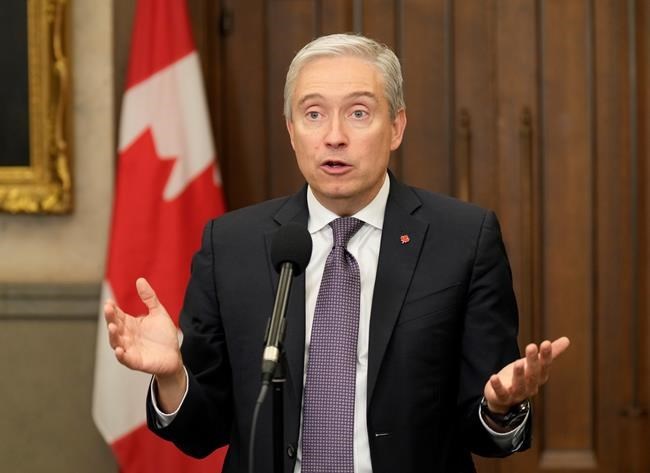
Innovation, Science and Industry Minister Francois-Philippe Champagne responds to a question as he speaks with reporters before Question Period, in Ottawa, Tuesday, Sept. 24, 2024. THE CANADIAN PRESS/Adrian Wyld
Republished September 24, 2024 - 3:07 PM
Original Publication Date September 24, 2024 - 1:16 PM
OTTAWA - The federal Liberals are creating a new agency to beef up Canada's ability to handle rapidly spreading infectious diseases and protect from future pandemics.
Industry Minister François-Philippe Champagne said the agency is meant to preserve the "top-gun team" of public servants that helped steer Canadians through COVID-19.
Health Emergency Readiness Canada is being tasked with boosting Canada's life-sciences sector and ensuring Canadians get faster access to vaccines, medical therapies and diagnostics by accelerating the transition from research to commercialization.
"The danger would have been (that) if we don't have a permanent agency sitting somewhere, that collective knowledge that we have accumulated during COVID would even be dispersed eventually, perhaps even lost within the civil service," Champagne told reporters on Tuesday.
"We're pulling them together in a team so that when people are talking about health, emergency readiness, they know where to knock."
The new agency will be based in the Industry Department but include staff from the Public Health Agency of Canada and Health Canada. Champagne said it requires no new legislation and is based on spending Parliament already approved through this year's budget.
"We want to keep a very close nexus with industry," Champagne said.
The agency will co-ordinate efforts between Canadian industry and academic researchers as well as with international partners.
This follows a similar move by the European Union to create an agency in 2021 that not only tries to prepare the continent for pandemics, but seeks to learn from mistakes during the COVID-19 pandemic.
Canada was not adequately prepared for the COVID-19 pandemic with an outdated and understocked emergency stockpile, and a virtually non-existent vaccine production industry.
Last year, the British Medical Journal called out Canada's "major pandemic failures" such as jurisdictional wrangling and a high death rate in long-term care homes.
Yet the Trudeau government has resisted calls from medical experts and the NDP to follow countries like the U.K. in having an inquiry into how governments handled the COVID-19 pandemic and how they could better manage a future pandemic.
When asked about an inquiry, Champagne said the announcement is focused on having the right materials and researchers on hand when needed.
"We all hope that there be no other pandemic. But the responsible thing to do is to make sure that you have the team stand by and ready," he said.
Champagne told a biotechnology industry gathering on Friday that officials found Canada was not ready in co-ordinating "health emergency readiness" when peers started looking into preparing for future events.
"We realized that things were scattered," he said.
He said Canada faced the danger of being the only G7 country "without a dedicated team" for pandemic preparedness.
Once fully operational, the agency will have an "industrial game plan" to move quickly on research and industrial mobilization if another health emergency like a pandemic is declared.
Champagne said the pandemic and investments in personalized medicine have made the public enthusiastic about the biotechnology sector.
"If there is one industry that I think Canadians have fallen in love again with, it's certainly that industry," he said.
This report by The Canadian Press was first published Sept. 24, 2024.
News from © The Canadian Press, 2024